Dogs, Frogs and a Pink Moon
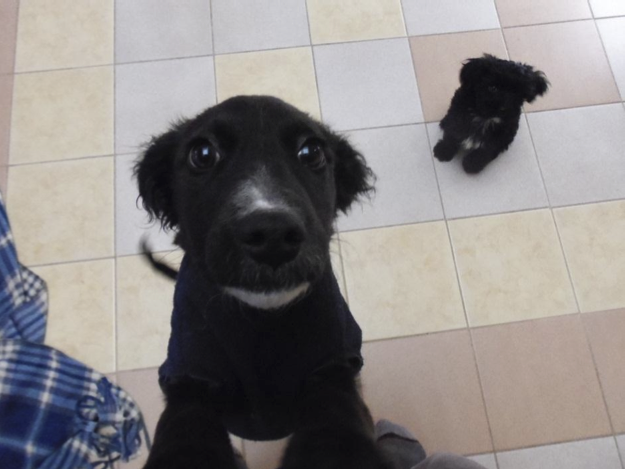 Suma, the dog we rescued from the street early on New Year's Day, has a new sister, "Wawita!" The name is Aymara for "Baby." Suma's a whole lot bigger than when we found her. And mercifully, she ditched puppyhood when we bought Wawita. The little one was frisking around outside a hostel we walk by on our way to and from the market. We asked if she was for sale and learned that, yes, we could buy her for 40 Bolivianos. Then the priced climbed to 50 B, about $7 dollars.
Suma, the dog we rescued from the street early on New Year's Day, has a new sister, "Wawita!" The name is Aymara for "Baby." Suma's a whole lot bigger than when we found her. And mercifully, she ditched puppyhood when we bought Wawita. The little one was frisking around outside a hostel we walk by on our way to and from the market. We asked if she was for sale and learned that, yes, we could buy her for 40 Bolivianos. Then the priced climbed to 50 B, about $7 dollars.
We clinched the deal and promptly bought more puppy chow. But ever since that day, the one vender in Copa who sells dog chow has been closed. The shop was shuttered for the 8-day celebration of Carnival (more on that in a moment), and for the four days since Carnival ended. Friends in town advised us to make food for the dogs. Since we had no alternative, we gave it a try. They love it! Suma eats hers in two gulps. Or just one. If you're curious, the "recipe" is simple: about 25% boneless, skinless, cooked and shredded chicken, 75% mixed grains and legumes, and veggies cooked in water to a dense mush, then cooled. We use cornmeal, rice, lentils, garbanzos, oatmeal, cracked wheat and pasta; and throw in a shredded carrot or two. It's faster to stir this constantly over low to medium heat. But I've also baked it when I'm too busy to stir for 20-30 minutes. No salt, sugar or onions. But mild green spices like basil or oregano are OK, and quite to our dogs' taste. Sometimes the garbanzos, rice and/or lentils are still al dente — no problem.
Pink Moon, Raining Frogs
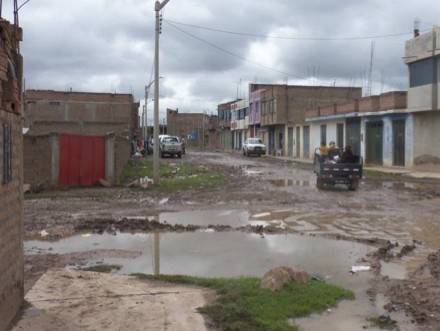 If you read our last blog, you may recall that December through February is rainy season here. Most days, the rain rolled in by about 8 p.m., and poured steadily until about noon the next day, with intermittent bursts of pelting deluges.
If you read our last blog, you may recall that December through February is rainy season here. Most days, the rain rolled in by about 8 p.m., and poured steadily until about noon the next day, with intermittent bursts of pelting deluges.
For the past week or so the moon here has had a pink cast to it. We figure that's because the setting sun illuminated the gathering storm clouds on that horizon, and reflected a pink glow on the moon. It's been lovely.
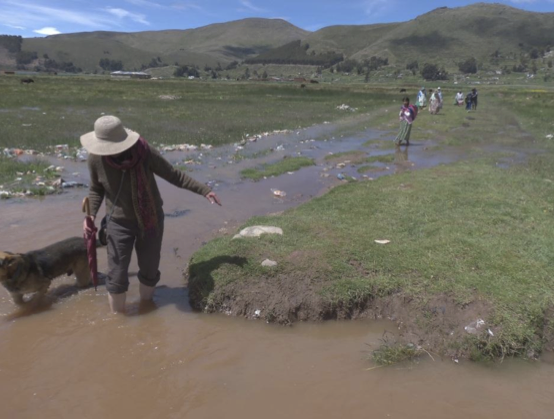 We've never experienced anything like rain during South America's rainy season. In low-lying fields, water stood one- to two-feet deep. Streets became rivers, and streams became torrents. The dirt roads out in the campo, where we've had to walk for several meetings, were knee-deep in muddy water washing from the farm fields. People here throw a lot of trash along roadsides. We waded through islands of candy wrappers, plastic bags and bottles, and dirty diapers. Glad we got our vaccines!
We've never experienced anything like rain during South America's rainy season. In low-lying fields, water stood one- to two-feet deep. Streets became rivers, and streams became torrents. The dirt roads out in the campo, where we've had to walk for several meetings, were knee-deep in muddy water washing from the farm fields. People here throw a lot of trash along roadsides. We waded through islands of candy wrappers, plastic bags and bottles, and dirty diapers. Glad we got our vaccines!
Happily, rainy season is winding to an end! One thing we rather enjoyed about rainy season was watching thousands of tadpoles wriggling in roadside puddles. Those polliwogs sprouted legs, and now there are a hoppin' lot of them! Walking up to market today, we saw hundreds of them scalloping up the road. I snatched up a handful and invited them to feast on the bugs in my veggie garden.
Carnival in Copa
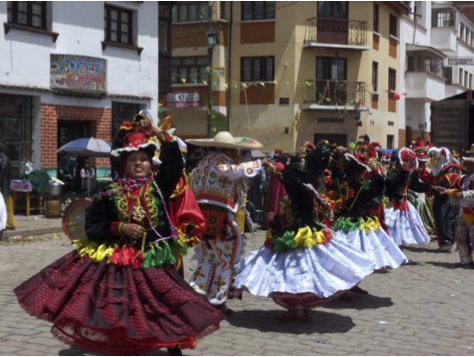
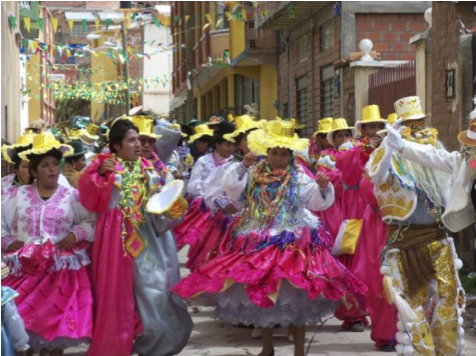
In the States, we call it Mardi Gras, Fat Tuesday, the daylong indulgent bash before Lent begins. Here, it's called Carnival. Officially, it begins the day before Lent, and runs for a solid week. But folks here wouldn't squander a perfectly good weekend before the official celebrations. The parades and partying started on Friday, Feb. 17, and ramped up for three days.
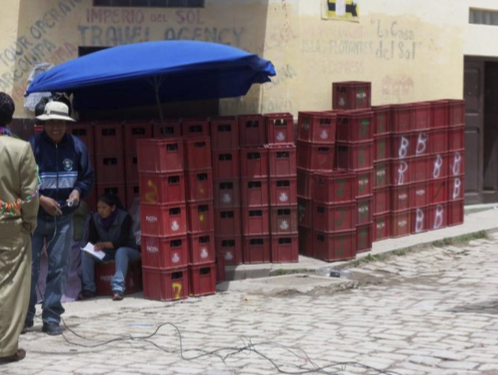 Then the big festivities exploded. Marching bands, street bands and bandstands playing all over town, all day, every day. Fireworks all day and all night. Costumed dancers, parades, and lots of drinking. There were cases of beer in room-sized towers nearly as tall as I am — all over town, all day, all night. For ten days.
Then the big festivities exploded. Marching bands, street bands and bandstands playing all over town, all day, every day. Fireworks all day and all night. Costumed dancers, parades, and lots of drinking. There were cases of beer in room-sized towers nearly as tall as I am — all over town, all day, all night. For ten days.We learned that, centuries before Catholicism arrived with the Spanish conquerors, these festivities were originally a celebration of the coming harvest. All the dancing and music, the costumes and processions, were part of a performance for Pacha Mama, Mother Earth, a plea for her to bless the people with a bountiful harvest. In fact, even today a sip of every beer consumed is always poured out on the ground for her sake, or slake.
How's the Job?
Despite all the partying up in town, we've been busy with mission work. Early this week we submitted our renewal application for The Advance. That's the Methodist Church's financial arm for missions worldwide. The Advance doesn't provide any funding, but it does ensure accountability and gives missions credibility when we work on fundraising.
 Just yesterday we received a formal project proposal from the director of a small, poor, rural school in Cusijata, about 3k outside of Copa. The director is asking the mission to pay for just the plastic sheeting for the roof a greenhouse for the school. Folks in the community will rebuild and enlarge an adobe greenhouse destroyed by a storm years ago (photo at left). Students will work in the greenhouse, honing their plant husbandry skills, along with math, marketing, and organization skills. They'll sell the produce, and apply the proceeds to pay for monthly internet service for the school's seven old computers (school officials would like to buy a few more). The director will also invite residents to use the internet after school hours, charging them a small fee, which will also help support the monthly service fees.
Just yesterday we received a formal project proposal from the director of a small, poor, rural school in Cusijata, about 3k outside of Copa. The director is asking the mission to pay for just the plastic sheeting for the roof a greenhouse for the school. Folks in the community will rebuild and enlarge an adobe greenhouse destroyed by a storm years ago (photo at left). Students will work in the greenhouse, honing their plant husbandry skills, along with math, marketing, and organization skills. They'll sell the produce, and apply the proceeds to pay for monthly internet service for the school's seven old computers (school officials would like to buy a few more). The director will also invite residents to use the internet after school hours, charging them a small fee, which will also help support the monthly service fees.
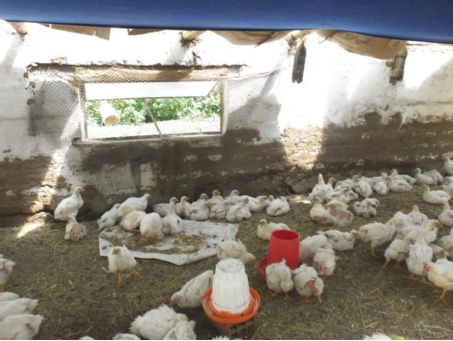
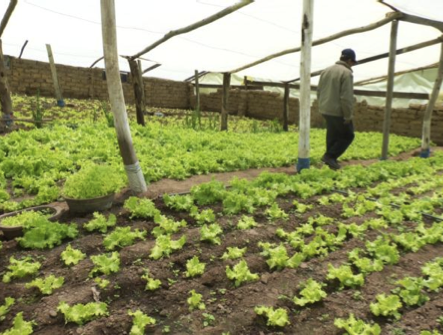
Sustainable chicken production and greenhouse in Sahuiña, Bolivia
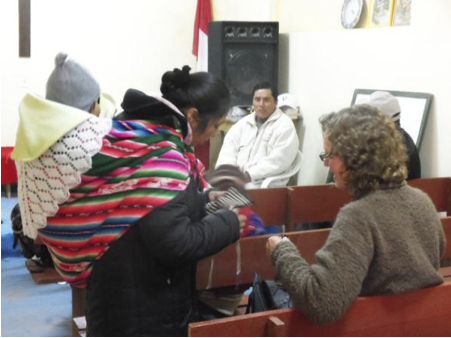 We've been working hard to cultivate the concept of sustainable projects. And we love the sustainability of the Cusijata plans. To help teach sustainability, we put together a short PowerPoint slide show in Spanish. Bishop Jorge Bravo in Peru recently saw the slide show. He invited us to present it at the 20th General Assembly of the Methodist Church of Peru being held in Tambo de Mora, Chincha, Perú. (We're trying to figure out if/how we can get there. It's about 200k south of Lima — a cheap 30-hour bus ride through the mountains, or an expensive flight from La Paz that routes through Bogota, Columbia.)
We've been working hard to cultivate the concept of sustainable projects. And we love the sustainability of the Cusijata plans. To help teach sustainability, we put together a short PowerPoint slide show in Spanish. Bishop Jorge Bravo in Peru recently saw the slide show. He invited us to present it at the 20th General Assembly of the Methodist Church of Peru being held in Tambo de Mora, Chincha, Perú. (We're trying to figure out if/how we can get there. It's about 200k south of Lima — a cheap 30-hour bus ride through the mountains, or an expensive flight from La Paz that routes through Bogota, Columbia.)
Virtual Mission Trip
 We know some of you are intrigued by the idea of a virtual mission trip. Please let us know where your thoughts are. We're eager to connect with you, and to connect you and your group with a project and the people here!
We know some of you are intrigued by the idea of a virtual mission trip. Please let us know where your thoughts are. We're eager to connect with you, and to connect you and your group with a project and the people here!
Connection
We're pretty sure a lot of our newsletter readers have thought: "I should send Deb and Jeff and email, say hello, see how they're doing." Some actually do that. If we've been on the fringe of your should-do list, please drop us a quick line. Down here south of the equator and high in the Andes, we sometimes feel a little detached.
We're looking for donors to "adopt" the Cusijata greenhouse roof or a new computer or two for the school, or to make a general donation to the mission to help support these types of initiatives. If you're interested, please let us know — or go to the link below
http://secure.gbgm-umc.org/donations/advance/donate.cfm?code=3021288
We will soon be updating our website, http://www.misionfronteras.com. If you haven't visited it in a while please do so after the middle of March.
As always, many thanks for your generous support, in all its forms! Please keep it coming!
With Love, Deb and Jeff
- Debbie Rissing's blog
- Log in to post comments
God, as known to us in Jesus Christ, welcomes all.
We welcome people of any race, national origin, ethnicity, gender, sexual orientation, age, social or economic status, employment status, or life situation; including people with physical or mental illness or disability.
We practice loving acceptance of each person and respectful discussion
 of our differences.
of our differences.
Affiliated to Reconciling Ministries Network
Recent News
Sunday Worship Service - July 30 at 10:00 am
July 30, 2023 - 9:51am
Sunday Worship Service - July 23 at 10:00 am
July 23, 2023 - 9:48am
Sunday Worship Service - July 16 at 10:00 am
July 16, 2023 - 10:17am
Vacation Bible School
July 14, 2023 - 10:10pm
Sunday Worship Service - July 9 at 10:00 am
July 9, 2023 - 9:53am






